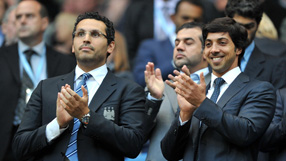Manchester City to scale back spending
MANCHESTER - Manchester City will scale back spending on players because they have built a strong enough squad, the world's richest club said on Friday after posting a big loss due to a transfer market splurge.

City posted losses of 121.3 million pounds in 2009/10, with a wage bill exceeding turnover in the year ending May 31.
Sheikh Mansour bin Zayed Al-Nahyan has spent more than 300 million pounds on big name signings since taking over City two years ago and the club are confident they will not need to spend quite so heavily for some time.
"It is safe to say that player acquisitions on the scale we have seen in recent transfer windows will no longer be required in the years ahead now that we have such a deep and competitive squad," chief executive Garry Cook said in a statement.
In search of their first silverware since 1976, City have paid big fees and huge weekly wages to bring in the likes of Carlos Tevez, Emmanuel Adebayor, Kolo Toure, Gareth Barry, Joleon Lescott, Yaya Toure, James Milner and David Silva.
Spending on wages came to 133.3 million pounds, exceeding turnover of 125.1 million in the year ending May 31.
IDEAL SHAPE
By finishing fifth last year, the club just missed out on their goal of a top-four finish and a Champions League berth but were confident they could achieve their aims this season.
Get FourFourTwo Newsletter
The best features, fun and footballing quizzes, straight to your inbox every week.
"In 2009/10, we narrowly fell short of our goals on the pitch, but still achieved nine club records including our best ever result in the Premier League," said Cook.
"Under the management of Roberto Mancini, the team is in ideal shape for the 2010/11 season and is committed to providing the fans with the result we are all hoping for."
City, who host Newcastle United on Sunday, are fourth in the standings, four points behind leaders Chelsea after six games.
The club said they saw positives in the fact they had achieved record turnover in 2009/10 which they put down to attracting new sponsors, the team's best Premier League performance and increased numbers of televised matches.
The results, though, come at a time when football finances have been in the spotlight with European governing body UEFA imposing financial fair play rules to oblige clubs to live within their means.
